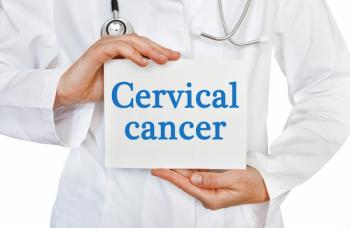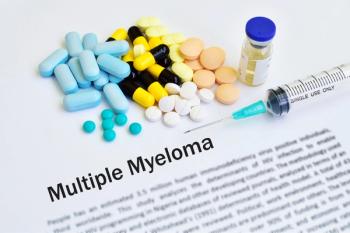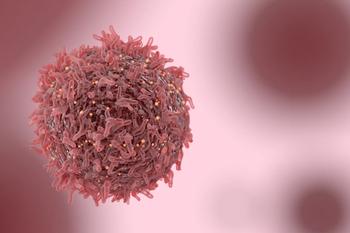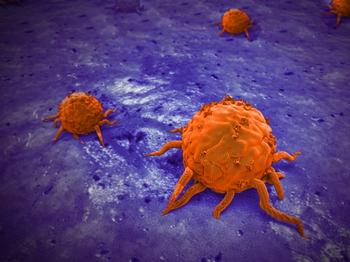
Tiragolumab plus Tecentriq and chemotherapy did not significantly improve progression-free survival and overall survival in patients with extensive-stage small-cell lung cancer.

Darlene Dobkowski, Managing Editor for CURE® magazine, has been with the team since October 2020 and has covered health care in other specialties before joining MJH Life Sciences. She graduated from Emerson College with a Master’s degree in print and multimedia journalism. In her free time, she enjoys buying stuff she doesn’t need from flea markets, taking her dog everywhere and scoffing at decaf.

Tiragolumab plus Tecentriq and chemotherapy did not significantly improve progression-free survival and overall survival in patients with extensive-stage small-cell lung cancer.

Twenty years of updates in technology, techniques and available medications has provided more hope for patients with colorectal cancer, with more advances on the horizon.

AstraZeneca, the manufacturer of the drug, announced that treatment with Imfinzi plus chemoradiotherapy did not improve survival compared with standard-of-care chemoradiotherapy alone in patients with locally advanced cervical cancer.

Patients with PSMA-positive metastatic castration-resistant prostate cancer can now be treated with Pluvicto, which may provide hope to an unmet need in this patient population.

The FDA’s approval of Keytruda is indicated for patients with advanced endometrial carcinoma with specific genetic characteristics whose disease progressed after systemic therapy and are not suitable for surgery or radiation.

One patient with stage 4 kidney cancer pivoted from being a journalist to a patient advocate, educating patients and others about a cancer that requires more awareness and research funding.

As The DONNA Foundation’s 15th annual marathon brings the breast cancer community together, two “streakers” discuss why they continue to participate in every marathon.

As more and more people in their 20s and 30s begin to receive diagnoses of multiple myeloma, a type of blood cancer, one expert stresses that continued research to improve survival in this patient population is critical.

A patient’s experience with polycythemia vera — a rare blood cancer — led to her becoming an advocate for others to help ease all the nerves and uncertainty that many patients face when they hear they have cancer.

Drugs that control blood pressure and lower cholesterol, among others, may help patients derive greater benefit from cancer treatment, but study findings have left researchers reassessing their next moves.

Aesthetic appearances, according to an expert at the UCSF, are often important for patients following the surgical treatment of cancer. Advancements in this space over the past 20 years have allowed many to patients to look as normal as possible.

Maintenance therapy with Ninlaro and Revlimid in patients with recently diagnosed multiple myeloma who underwent a stem cell transplant may safely improve survival, although more research is needed especially in high-risk patients.

As surgery is the current standard of care for patients with tenosynovial giant cell tumor, the potential to add another treatment option with fewer complications may dramatically help patients with this rare tumor.

Guidelines for the treatment of patients with brain metastases is moving from whole brain radiation therapy to less toxic treatment options to potentially improve care and increase survival.

Treatment with Cabometyx before surgery in patients with advanced renal cell carcinoma, a type of kidney cancer, may provide benefits, although further research is required before a decision is made about its role in presurgical treatment.

Patients with cancer who receive bone marrow or stem cells from either a related or unrelated donor may experience similar outcomes and quality of life post transplant, which may highlight the efforts made by teams to help patients along the way.

Supportive care should be implemented promptly after patients receive CAR-T cell therapy, but as one expert notes, patients with cancer are often referred for this care too late.

One expert noted that patients with prostate cancer can take a few months to make an informed treatment decision without impacting their long-term outcomes.

Side effects from cancer treatment with immunotherapy, which may include vitiligo and certain rashes, may point to who will respond better to the treatment, although more research is needed to determine how much weight to put on these data.

Opdivo plus Cabometyx prolonged survival with minimal effects to their health status, which may highlight the need for patients to advocate for their quality of life when making treatment decisions.

Kimmtrak is the first-ever drug to be granted FDA approval for this patient population of HLA-A*02:01-positive metastatic or unresectable uveal melanoma.

Researchers observed this benefit in recurrent HCC after liver transplantation, which represents a patient population often excluded from clinical trials due to potential organ rejection.

CAR-T cell therapy with Yescarta in patients with relapsed/refractory large B-cell lymphoma had improved responses to treatment and survival in the second-line setting, which may help save more lives than standard care, an expert said.

A recent study demonstrated that a lower dose of radiation after surgery for HPV-related throat cancer may provide a greater benefit than a higher dose of radiation with chemotherapy.

Sexual dysfunction may often happen after prostate cancer treatment, and the results of one study shown that an online program for both the patient and their partner may help in this aspect of recovery.

Patients with melanoma who consumed a high-fiber diet may have a better response to immunotherapy, although the benefit was not as great if the fiber was obtained via probiotic supplements.

Certain allergy medications like Zyrtec and Claritin may be the key for more patients to tolerate immunotherapy for several cancer types.

Patients with Down syndrome have an increased risk for leukemia during childhood, and toxicities related to treatment may be more common in this patient population.

Patients with a common brain tumor subtype that expresses ERK1/2 activation may obtain a greater survival benefit with PD-1 immunotherapy, although research needs to confirm whether this can be observed in all patients.

As the standard treatment for patients with renal cell carcinoma, the most common type of kidney cancer, related to VHL disease is often surgical procedures, the use of Welireg may reduce surgical burden in patients.